Dear Zazie, Here is today’s Lovers’ Chronicle from Cowboy Coleridge. Who do you want to fall into? Has someone fallin’ into you? Rhett
The Lovers’ Chronicle
Dear Muse,
you know, as in, for someone
“OK, i was thinking, but it’s spring”
this one started back in 2013
“In the land of the melodramatic”
absolutely, none more so
but now it belongs here
“In I for you”
and i for you
“Though the process
was circuitous”
the Hamlet question
“Sorry, now I’m lost”
to fall or not to fall
“Ha, come here, let’s fall again”
© copyright 2023 mac tag/cowboycoleridge all rights reserved
© copyright 2021 mac tag/cowboy coleridge all rights reserved
up to you to decide
whether noble or tragic
all i can attest to
is the story
not for everyone
details of what was done
drinkin’ amaro bitter and chaste
went dreamin’ and listened
let it pass because everything
will pass and be effaced
memories
are sounds that die in the breeze
© copyright 2020 mac tag/cowboycoleridge all rights reserved
tired
not sleepin’ well
need to write
summon the will
and trust my cape
as far as want
there is only one
just fall…
in fadin’ light
a tiredness,
a flickerin’ between
here, and where
we want to be
fallin’ back
to move on
meanderin’
along the edge
pushin’, dreamin’
tired to the bone
winter not done yet
the past blooms
with spring comin’
though, possibilities
and the tale to tell
over and over
wishin’, we will be
preparin’ to come
time spent together,
do you remember,
slants down to a dream
© copyright 2019 mac tag/cowboy coleridge all rights reserved
hey babe
i made it
wake up
and hold me
yeah like that
oh, i missed you
i heard “Missing You”
on the radio
’bout had to pull over
all i could think about,
was gittin’ back to you
i am so tired
hold me like this
for the rest of the night,
for the rest of…
© copyright 2018 mac tag/cowboy coleridge all rights reserved
Another one that started as a vignette and ended up as a poem. Hope you live……
Fall Into Her
He was so tired
He had not slept well
He needed to check on the horses
He needed to split and stack some wood
He needed to write
He needed to fix
The things in his life
That were broken
He would summon the will
To get the first things done
Always did
As for the broken things;
Well he would just have to trust his cape
But this is what he wanted to do,
What he really needed,
What he would love to do;
Just fall…
Fall into her
Into her arms
Fall into her
Into her charms
Fall in to her
Together forever
Together with her
© 2013 Cowboy Coleridge. All rights reserved.
The Song of the Day is “Falling Into You“ by Whiskey Falls. We do not own the rights this song. All rights reserved by the rightful owner. No copyright infringement intended.
| Torquato Tasso | |
|---|---|
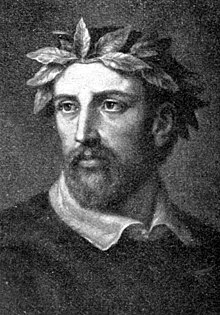
A depiction of Tasso from a German encyclopedia, 1905. Note the laurel crown.
|
|
Today is the birthday of Torquato Tasso (Sorrento, Kingdom of Naples; 11 March 1544 – 25 April 1595 Rome); poet of the 16th century, perhaps best known for his poem Gerusalemme liberata (Jerusalem Delivered, 1581), in which he depicts a highly imaginative version of the combats between Christians and Muslims at the end of the First Crusade, during the Siege of Jerusalem. He suffered from mental illness and died a few days before he was due to be crowned as the king of poets by the Pope. Until the beginning of the 20th century, Tasso remained one of the most widely read poets in Europe.
Verse
Aminta (1573)
- Ovunque i mi sia, io sono Amore.
Ne’pastori non men, che ne gli heroi;
E la disagguaglianza de’soggetti,
Come à me piace, agguaglio.- Prologue
- Forse, se tu gustassi anco una volta
La millesima parte de la gioie
Che gusta un cor amato riamando,
Diresti, ripentita, sospirando:
Perduto è tutto il tempo
Che in amar non si spende.- Act I, scene i, lines 26–31.
- S’ei piace, ei lice
- What you wish, you may.
- Act I, Chorus.
- What you wish, you may.
- Femina, cosa mobil per natura,
Più che fraschetta al vento, e più che cima
Di pieghevole spica.- Act I, scene ii. Compare: “Varium et mutabile semper femina”, Virgil, Aeneid, 4.569.
- Tu prima, Onor, velasti
La fonte dei diletti,
Negando l’onde a l’amorosa sete.- Act I, Choro, line 358.
- Veramente il secol d’oro è questo,
Poiché sol vince l’oro, e regna l’oro.- Act II, scene i.
- Amor servo de l’oro, è il maggior mostro,
Et il più abominabile, e il più sozzo,
Che produca la terra, o ‘l mar frà l’onde.- Act II, scene i.
- Il mondo invecchia,
E invecchiando intristisce.- Act II, scene ii.
- Hor, non sai tu, com’è fatta la donna?
Fugge, e fuggendo vuol, che altri la giunga;
Niega, e negando vuol, ch’altri si toglia;
Pugna, e pugnando vuol, ch’altri la vinca.- Act II, scene ii.
- O che gentile
Scongiuro hà ritrovato questo sciocco
Di rammentarmi la mia giovanezza,
Il ben passato, e la presente noia.- Act II, scene ii.
- Amor nascente hà corte l’ali, à pena
Può sù tenerle, e non le spiega à volo.- Act II, scene ii.
- Amor, leggan pur gli altri
Le Socratiche carte,
Ch’io in due begl’occhi apprenderò quest’arte.- Act II, Chorus.
- Dispietata pietate
Fù la tua veramente, ò Dafne, allhora,
Che ritenesti il dardo.- Act III, scene ii.
- Non bisogna la morte,
Ch’astringer nobil cuore,
Prima basta la fede, e poi l’amore.- Act III, Chorus.
- La pietà messaggiera è de l’Amore,
Come’l lampo del tuon.- Pity is the messenger of Love
as lightning is of thunder.- Act IV, scene i.
- Pity is the messenger of Love
- La vergogna ritien debile amore;
Ma debil freno è di potente Amore- Act V, scene i.
Today is the birthday of Louis Boulanger (Louis Candide Boulanger; Vercelli, Italy 11 March 1806 – 5 March 1867 Dijon, France); Romantic painter, pastellist, lithographer and a poet, known for his religious and allegorical subjects, portraits, genre scenes.
Among his notable friends were Victor Hugo, history painter Eugène Devéria, writer Honoré de Balzac, poet Aloysius Bertrand, literary critic Charles Augustin Sainte-Beuve, novelist Alexandre Dumas fils, architect Charles Robelin, writer Alfred de Musset, sculptor David d’Angers, painter Nicolas Toussaint Charlet, and writer Prosper Mérimée.
In 1827 he and Devéria illustrated “Souvenirs du Théâtre Anglais à Paris” by Charles-François-Jean-Baptiste Moreau de Commagny. This year he obtained the second-class medal from the École des Beaux-Arts, followed by the first-class medal in 1836 and the cross in 1840.
In 1829 he went to Germany and in 1831 England, with Sainte-Beuve and Robelin, to visit museums and churches. He kept journals of his travels.
He illustrated several Romantic works of Alexandre Dumas, “Les Orientales” (1827) and seven editions of “The Hunchback of Notre-Dame” (1836) by Hugo, and “Souvenirs du théâtre anglais à Paris” by Moreau de Commagny. Both Hugo and Boulanger were passionate about knights, dragons and medieval mobsters.
Boulanger created stage costumes for some of Victor Hugo’s theater plays, such as “Hernani” in 1829, “Ruy Blas” in 1838, and “Les Burgraves”, in 1843.
From 1835 his style shifted from romanticism and focused on more detailed design, turning to classical literature for inspiration. He produced most of his portraits during this time.
In 1846 he travelled to Spain with Dumas, Giraud and Maquet. After visiting Toledo, Aranjuez, Jaen and Granada, they arrived to Madrid to visit the Prado Museum, where Boulanger was particularly struck by Goya, Velázquez, Titian, Rubens and Salvator Rosa. After this trip his style shifted again to explore more romantic techniques.
In 1850 Boulanger painted the chapel of the Souls of Purgatory at Saint-Roch and a “Torment of St-Laurent” in the transept chapel of Saint-Laurent church in Paris. He also provided mural paintings for the frieze of the Palace of Versailles, the Senate chamber at the Luxembourg Palace, and the Palace de Saint-Cloud.
Louis Boulanger took an active role in the Romantic Movement and painted the portraits of several personalities such as writer George Sand, Victor Hugo, Adèle Foucher, writer Petrus Borel and many others.
His paintings show the influence of French painter Antoine-Jean Gros, French painter and writer Eugène Fromentin, English painter John Constable, and later in life by Spanish painter Francisco Goya.
Although his creations may be criticised for their ‘literary’ inspiration (in particular “La Ronde du Sabbat”, and “Petrarch’s Triumph”), his pastel sky studies prefigure Paul Huet and Eugène Boudin.
His works can be found in French collections, including the Louvre, Maison de Victor Hugo, and Musée des beaux-arts de Tours.
Gallery
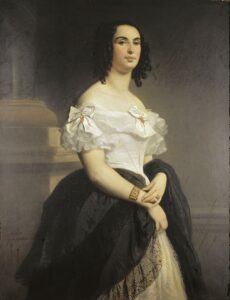
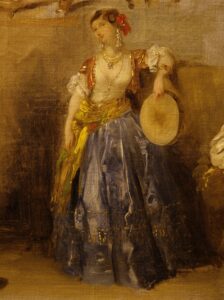
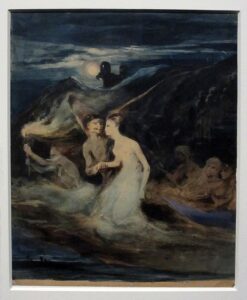
Les Fantômes
Today is the day in 1851 – The first performance of Rigoletto by Giuseppe Verdi takes place in Venice.

Set design by Philippe Chaperon.
|
|
Rigoletto is an opera in three acts by Giuseppe Verdi. The Italian libretto was written by Francesco Maria Piave based on the play Le roi s’amuse by Victor Hugo. Despite serious initial problems with the Austrian censors who had control over northern Italian theatres at the time, the opera had a triumphant premiere at La Fenice in Venice on 11 March 1851.
In my opinion, the first of the operatic masterpieces of Verdi’s middle-to-late career. Its tragic story revolves around the licentious Duke of Mantua, his hunch-backed court jester Rigoletto and Rigoletto’s beautiful daughter Gilda. The opera’s original title, La maledizione (The Curse), refers to the curse placed on both the Duke and Rigoletto by a courtier whose daughter had been seduced by the Duke with Rigoletto’s encouragement. The curse comes to fruition when Gilda likewise falls in love with the Duke and eventually sacrifices her life to save him from the assassins hired by her father.
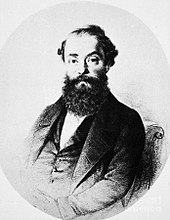

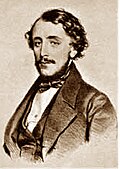


Synopsis
- Place: Mantua
- Time: the Sixteenth century
Act 1
Scene 1: A room in the palace of Duke of Mantua

At a ball in his palace, the Duke sings of a life of pleasure with as many women as possible: “Questa o quella” (“This woman or that”). He has seen an unknown beauty in church and desires to possess her, but he also wishes to seduce the Countess of Ceprano. Rigoletto, the Duke’s hunchbacked court jester, mocks the husbands of the ladies to whom the Duke is paying attention, including the Count Ceprano, and advises the Duke to get rid of him by prison or death. The Duke laughs indulgently, but Ceprano is not amused. Marullo, one of the guests at the ball, informs the courtiers that Rigoletto has a “lover”, which astonishes them. The courtiers resolve to take vengeance on Rigoletto for making fun of them. The festivities are interrupted by the arrival of the elderly Count Monterone, whose daughter the Duke had seduced. Rigoletto provokes him further by making fun of his helplessness to avenge his daughter’s honor. Monterone confronts the Duke, and is immediately arrested by the Duke’s guards. Before being led off to prison, Monterone curses Rigoletto for having mocked his righteous anger. The curse terrifies Rigoletto, who is superstitious and, like many people at the time, believes that an old man’s curse has real power.

Scene 2: A street, with the courtyard of Rigoletto’s house
Preoccupied with the old man’s curse, Rigoletto approaches his house and is accosted by the assassin Sparafucile, who walks up to him and offers his services. Rigoletto declines for the moment, but leaves open the possibility of hiring Sparafucile later, should the need arise. Sparafucile wanders off, after repeating his own name a few times. Rigoletto contemplates the similarities between the two of them: “Pari siamo!” (“We are alike!”); Sparafucile kills men with his sword, and Rigoletto uses “a tongue of malice” to stab his victims. Rigoletto opens a door in the wall and returns home to his daughter Gilda. They greet each other warmly: “Figlia!” “Mio padre!” (“Daughter!” “My father!”). Rigoletto has been concealing his daughter from the Duke and the rest of the city, and she does not know her father’s occupation. Since he has forbidden her to appear in public, she has been nowhere except to church and does not even know her own father’s name.
When Rigoletto has gone, the Duke appears and overhears Gilda confess to her nurse Giovanna that she feels guilty for not having told her father about a young man she had met at the church. She says that she fell in love with him, but that she would love him even more if he were a student and poor. As she declares her love, the Duke enters, overjoyed. Gilda, alarmed, calls for Giovanna, unaware that the Duke had sent her away. Pretending to be a student, the Duke convinces Gilda of his love: “È il sol dell’anima” (“Love is the sunshine of the soul”). When she asks for his name, he hesitantly calls himself Gualtier Maldè. Hearing sounds and fearing that her father has returned, Gilda sends the Duke away after they quickly trade vows of love: “Addio, addio” (“Farewell, farewell”). Alone, Gilda meditates on her love for the Duke, whom she believes is a student: “Gualtier Maldè!… Caro nome” (“Dearest name”).
Later, Rigoletto returns: “Riedo!… perché?” (“I’ve returned!… why?”), while the hostile courtiers outside the walled garden (believing Gilda to be the jester’s mistress, unaware she is his daughter) get ready to abduct the helpless girl. They tell Rigoletto that they are actually abducting the Countess Ceprano. He sees that they are masked and asks for a mask for himself; while they are tying the mask onto his face, they also blindfold him. Blindfolded and deceived, he holds the ladder steady while they climb up to Gilda’s room: Chorus: “Zitti, zitti” (“Softly, softly”). With her father’s unknowing assistance Gilda is carried away by the courtiers. Left alone, Rigoletto removes his mask and blindfold, and realizes that it was in fact Gilda who was carried away. He collapses in despair, remembering the old man’s curse.
Act 2
The Duke’s Palace
The Duke is concerned that Gilda has disappeared: “Ella mi fu rapita!” (“She was stolen from me!”) and “Parmi veder le lagrime” (“I seem to see tears”). The courtiers then enter and inform him that they have captured Rigoletto’s mistress: Chorus: “Scorrendo uniti” (“We went together at nightfall”). By their description, he recognizes it to be Gilda and rushes off to the room where she is held: “Possente amor mi chiama” (“Mighty love beckons me”). Pleased by the Duke’s strange excitement, the courtiers now make sport with Rigoletto, who enters singing. He tries to find Gilda by pretending to be uncaring, as he fears she may fall into the hands of the Duke. Finally, he admits that he is in fact seeking his daughter and asks the courtiers to return her to him: “Cortigiani, vil razza dannata” (“Accursed race of courtiers”). Rigoletto attempts to run into the room in which Gilda is being held, but the courtiers block the way. Gilda enters. The courtiers leave the room, believing Rigoletto has gone mad. Gilda describes to her father what has happened to her in the palace: “Tutte le feste al tempio” (“On all the blessed days”). In a duet Rigoletto swears vengeance against the Duke, while Gilda pleads for her lover: “Sì! Vendetta, tremenda vendetta!” (“Yes! Revenge, terrible revenge!”).
Act 3
A street outside Sparafucile’s house

Rigoletto bargains with the assassin, who is ready to murder his guest for 20 scudi. Rigoletto orders Gilda to put on a man’s clothes to prepare to leave for Verona and states that he plans to follow later. With falling darkness, a thunderstorm approaches and the Duke decides to spend the rest of the night in the house. Sparafucile directs him to the ground floor sleeping quarters, resolving to kill him in his sleep.
Gilda, who still loves the Duke despite knowing him to be unfaithful, returns dressed as a man and stands outside the house. Maddalena, who is smitten with the Duke, begs Sparafucile to spare his life. Sparafucile reluctantly promises her that if by midnight another victim can be found, he will kill the other instead of the Duke. Gilda, overhearing this exchange, resolves to sacrifice herself for the Duke, and enters the house. Sparafucile stabs her and she collapses, mortally wounded.
At midnight, when Rigoletto arrives with money, he receives a corpse wrapped in a sack, and rejoices in his triumph. Weighting it with stones, he is about to cast the sack into the river when he hears the voice of the Duke, sleepily singing a reprise of his “La donna è mobile” aria. Bewildered, Rigoletto opens the sack and, to his despair, discovers his dying daughter. For a moment, she revives and declares she is glad to die for her beloved: “V’ho ingannato” (“Father, I deceived you”). She dies in his arms. Rigoletto cries out in horror: “La maledizione!” (“The curse!”)
And today is the day in 1867 – The first performance of Don Carlos by Giuseppe Verdi takes place in Paris.

Carlo Cornaglia’s depiction of Act IV (the original Act V) in the 1884 La Scala production
|
|
Don Carlos is a five-act grand opera composed by Giuseppe Verdi to a French-language libretto by Joseph Méry and Camille du Locle, based on the dramatic play Don Carlos, Infant von Spanien (Don Carlos, Infante of Spain) by Friedrich Schiller. The opera is usually performed in Italian.
The opera’s story is based on conflicts in the life of Carlos, Prince of Asturias (1545–1568). Though he was betrothed to Elisabeth of Valois, part of the peace treaty ending the Italian War of 1551–1559 between the Houses of Habsburg and Valois demanded that she be married instead to his father Philip II of Spain. It was commissioned and produced by the Théâtre Impérial de l’Opéra (Paris Opera) and given its premiere at the Salle Le Peletier on 11 March 1867.
When performed in one of its several Italian versions, the opera is generally called Don Carlo. The first Italian version given in Italy was in Bologna in March 1867. Revised again by Verdi, it was given in Naples in November/December 1872. Finally, two other versions were prepared: the first was seen in Milan in January 1884 (in which the four acts were based on some original French text which was then translated). That is now known as the “Milan version”, while the second—also sanctioned by the composer—became the “Modena version” and was presented in that city in December 1886. It restored the “Fontainebleau” first act to the Milan four-act version.
Over the following twenty years, cuts and additions were made to the opera, resulting in a number of versions being available to directors and conductors. No other Verdi opera exists in so many versions. At its full length (including the ballet and the cuts made before the first performance), it contains close to four hours of music and is Verdi’s longest opera.



Synopsis
- [This synopsis is based on the original five-act version composed for Paris and completed in 1866. Important changes for subsequent versions are noted in indented brackets. First lines of arias, etc., are given in French and Italian].
Act 1

- [This act was omitted in the 1883 revision]
The Forest of Fontainebleau, France in winter
A prelude and chorus of woodcutters and their wives is heard. They complain of their hard life, made worse by war with Spain. Elisabeth, daughter of the King of France, arrives with her attendants. She reassures the people that her impending marriage to Don Carlos, Infante and son of Philip II, King of Spain, will bring the war to an end, and departs.
- [This was cut before the Paris première and replaced by a short scene in which Elisabeth crosses the stage and hands out money to the woodcutters; she exits without singing]
Carlos, coming out from hiding, has seen Elisabeth and fallen in love with her (Aria: “Je l’ai vue” / “Io la vidi”). When she reappears, he initially pretends to be a member of the Count of Lerma’s delegation. She asks him about Don Carlos, whom she has not yet met. Before long, Carlos reveals his true identity and his feelings, which she reciprocates (Duet: “De quels transports poignants et doux” / “Di quale amor, di quanto ardor”). A cannon-shot signifies that peace has been declared between Spain and France. Thibault appears and gives Elisabeth the surprising news that her hand is to be claimed not by Carlos but by his father, Philip. When Lerma and his followers confirm this, Elisabeth is devastated but feels bound to accept, in order to consolidate the peace. She departs for Spain, leaving Carlos equally devastated.
Act 2
- [This is Act 1 in the 1883 revision]

Scene 1: The monastery of Saint-Just (San Jerónimo de Yuste) in Spain
The scene takes place soon after King Philip II and Elisabeth have gotten married. Monks pray for the soul of the former Emperor Charles V (“Carlo Quinto”). The monks’ leader proclaims that the Emperor was proud but has been humbled though error, and that the turbulence of the world persists even in sacred places; we cannot rest except in Heaven.
Don Carlos enters, anguished that the woman he loves is now his stepmother.
- [In the 1883 revision, he sings a revised version of the aria “Je l’ai vue” / “Io la vidi”, which was salvaged from the omitted first act but with some different music and different text to reflect his current situation. In the four-act version he already knows that he cannot marry Elisabeth. In the original, when singing the aria, he was still expecting to marry her]
Carlos greets his great friend Rodrigue, Marquis of Posa, who has just arrived from the oppressed land of Flanders (Aria: “J’étais en Flandres”).
- [This was cut during the pre-première rehearsals]
Posa asks for the Infante’s aid on behalf of the suffering people there. Carlos reveals that he loves his stepmother. Posa is first shocked, but then sympathetic. He encourages Carlos to leave Spain and go to Flanders, and to forget his pain by focusing on political activity there. The two men swear eternal friendship (Duet: “Dieu, tu semas dans nos âmes” / “Dio, che nell’alma infondere”).
King Philip and his new wife, with their attendants, enter also to do homage at Charles V’s tomb, while Don Carlos laments his lost love.
Scene 2: A garden near Saint-Just
Princess Eboli sings the Veil Song (“Au palais des fées” / “Nel giardin del bello”) about a Moorish King trying to seduce an alluring veiled beauty, who turns out to be his own neglected wife. Elisabeth enters. Posa gives her a letter from France, which covers a secret note from Don Carlos. At his urging (Aria: “L’Infant Carlos, notre espérance” / “Carlo ch’è sol il nostro amore”), Elisabeth agrees to see the Infante alone. Unaware of this relationship, Eboli infers that she, Eboli, is the one Don Carlos loves.
When they are alone, Don Carlos tells Elisabeth that he is miserable, and asks her to request the King to send him to Flanders. She promptly agrees, provoking Carlos to renew his declarations of love, which she piously rejects. Don Carlos exits in a frenzy, shouting that he must be under a curse. The King enters and becomes angry because the Queen is alone and unattended. His suspicions are insulting to her. He orders the lady-in-waiting who was meant to be attending her, the Countess of Aremberg, to return to France, prompting Elizabeth to sing a sorrowful farewell-aria. (Aria: “Oh ma chère compagne” / “Non pianger, mia compagna”).
The King now approaches Posa, with whose character and activism he is impressed, and offers to reward him for his loyalty and service. Posa begs the King to stop oppressing the people of Flanders. The King calls Posa’s idealism unrealistic and warns that the Grand Inquisitor is watching him. The King confides in Posa, telling him that he fears that Carlos is having an affair with Elisabeth. Posa replies that Carlos is innocent, and offers to watch Elisabeth and to be responsible for her good behavior. The King gratefully accepts this offer, and again warns Posa to beware of the Grand Inquisitor.
- [This dialogue was revised three times by Verdi.]
Act 3
- [This is Act 2 in the 1883 revision]
Scene 1: Evening in the Queen’s garden in Madrid
Elisabeth is tired, and wishes to concentrate on the following day’s coronation of the King. To avoid the divertissement planned for the evening, she exchanges masks with Eboli, assuming that thereby her absence will not be noticed, and leaves.
- [This scene was omitted from the 1883 revision]
- [In the première, the ballet (choreographed by Lucien Petipa and entitled “La Pérégrina”) took place at this point]
Don Carlos enters, clutching a note suggesting a tryst in the gardens. Although he thinks this is from Elisabeth, it is really from Eboli. Eboli, who still thinks Don Carlos loves her, enters. Don Carlos mistakes her for Elisabeth in the dark, and passionately declares his love. When he sees Eboli’s face, he realizes his error and recoils from her. Eboli guesses his secret – that he was expecting the Queen, whom he loves. Carlos, terrified, begs for mercy. Posa enters. Eboli threatens to tell the King that Elisabeth and Carlos are lovers. Posa warns her not to cross him; he is the King’s confidant. Eboli replies by hinting darkly that she a formidable and dangerous foe, with power which Posa does not yet know about. (Her power is that she is having an affair with the King, but she does not reveal this yet.) Posa draws his dagger, intending to stab her to death, but reconsiders, spares her, and declares his trust in the Lord. Eboli exits in a vengeful rage. Posa advises Carlos to entrust to him any sensitive, potentially incriminating political documents that he may have and, when Carlos agrees, they reaffirm their friendship.
Scene 2: In front of the Cathedral of Valladolid
Preparations are being made for an “Auto-da-fé”, the public parade and burning of condemned heretics. While the people celebrate, monks drag the condemned to the woodpile. A royal procession follows, and the King addresses the populace, promising to protect them with fire and sword. Don Carlos enters with six Flemish envoys, who plead with the King for their country’s freedom. Although the people and the court are sympathetic, the King, supported by the monks, orders his guards to arrest the envoys. Carlos demands that the King grant him authority to govern Flanders; the King scornfully refuses. Enraged, Carlos draws his sword against the King. The King calls for help but the guards will not attack Don Carlos. Posa steps in and takes the sword from Carlos. Relieved and grateful, the King raises Posa to the rank of Duke. The monks fire the woodpile, and as the flames start to rise, a heavenly voice can be heard promising heavenly peace to the condemned souls.
Act 4
- [This is Act 3 in the 1883 revision]
Scene 1: Dawn in King Philip’s study in Madrid
Alone, the King, in a reverie, laments that Elisabeth has never loved him, that his position means that he has to be eternally vigilant and – returning to a central theme – that he will only sleep properly when he is in his tomb in the Escorial (Aria: “Elle ne m’aime pas” / “Ella giammai m’amò”). The blind, ninety-year-old Grand Inquisitor is announced and shuffles into the King’s apartment. When the King asks if the Church will object to him putting his own son to death, the Inquisitor replies that the King will be in good company: God sacrificed His own son. In return for his support, the Inquisitor demands that the King have Posa killed. The King refuses at first to kill his friend, whom he admires and likes. However, the Grand Inquisitor reminds the King that the Inquisition can take down any king; he has created and destroyed other rulers before. Frightened and overwhelmed, the King begs the Grand Inquisitor to forget about the past discussion. The latter replies “Peut-être” / “Forse!” – perhaps! – and leaves. The King bitterly muses on his helplessness to oppose the Church.
Elisabeth enters, alarmed at the apparent theft of her jewel casket. However, the King produces it and points to the portrait of Don Carlos which it contains, accusing her of adultery. She protests her innocence but, when the King threatens her, she faints. In response to his calls for help, into the chamber come Eboli and Posa. Their laments of suspicion cause the King to realize that he has been wrong to suspect his wife (“Maudit soit le soupçon infâme” / “Ah, sii maledetto, sospetto fatale”). Aside, Posa resolves to save Carlos, though it may mean his own death. Eboli feels remorse for betraying Elisabeth; the latter, recovering, expresses her despair.
- [This quartet was revised by Verdi in 1883]
Elisabeth and Eboli are left together.
- [Duet: “J’ai tout compris”, was cut before the première]
Eboli confesses that it was she who told the King that Elisabeth and Carlos were having an affair, for revenge against Carlos for having rejected her. She also confesses that she herself has had an affair with the King. Elisabeth orders her to go into exile, or enter a convent. After Elisabeth exits, Eboli, left alone, curses her own beauty and pride, and resolves to make amends by trying to save Carlos from the Inquisition (Aria: “O don fatal” / “O don fatale”).
Scene 2: A prison
Don Carlos has been imprisoned. Posa arrives and tells Carlos that he (Posa) has saved Carlos from being executed, by allowing himself (Posa) to be incriminated by the politically sensitive documents which he had obtained from Carlos earlier (Aria, part 1: “C’est mon jour suprême” / “Per me giunto è il dì supremo”). A shadowy figure appears–one of the Grand Inquisitor’s assassins–and shoots Posa in the chest. As he dies, Posa tells Carlos that Elisabeth will meet him at Saint-Just the following day. He adds that he is content to die if his friend can save Flanders and rule over a happier Spain (Aria, part 2: “Ah, je meurs, l’âme joyeuse” / “Io morrò, ma lieto in core”). At that moment, the King enters, offering his son freedom, as Posa had arranged. Carlos repulses him for having murdered Posa. The King sees that Posa is dead and cries out in sorrow.
- [Duet: Carlos and the King- “Qui me rendra ce mort ?” /”Chi rende a me quest’uom” It was cut before the première and, following it, Verdi authorized its optional removal. The music was later re-used by Verdi for the Lacrimosa of his Messa da Requiem of 1874]
Bells ring as Elisabeth and Eboli enter. The crowd pushes its way into the prison and threatens the King, demanding the release of Carlos. In the confusion, Eboli escapes with Carlos. The people are brave enough at first in the presence of the King, but they are terrified by the arrival of the Grand Inquisitor, and instantly obey his angry command to quiet down and pay homage to the King.
- [After the première, some productions ended this act with the death of Posa. However, in 1883 Verdi provided a much shortened version of the insurrection, as he felt that otherwise it would not be clear how Eboli had fulfilled her promise to rescue Carlos]
Act 5
- [This is Act 4 in the 1883 revision]
The moonlit monastery of Yuste
Elisabeth kneels before the tomb of Charles V. She is committed to help Don Carlos on his way to fulfill his destiny in Flanders, but she herself longs only for death (Aria: “Toi qui sus le néant” / “Tu che le vanità”). Carlos appears and tells her than he has overcome his desire for her; he now loves her honorably, as a son loves his mother. They say a final farewell, promising to meet again in Heaven (Duet: “Au revoir dans un monde où la vie est meilleure” / “Ma lassù ci vedremo in un mondo migliore”).
- [This duet was twice revised by Verdi]
The King and the Grand Inquisitor enter. The King infers that Carlos and Elisabeth have been lovers and demands that they both be immediately killed in a double sacrifice. The Inquisitor confirms that the Inquisition will do its duty. A short summary trial follows, confirming Carlos’s putative culpability.
- [The trial was omitted in 1883 and does not occur on any recording]
Carlos, calling on God for protection, draws his sword to defend himself against the guards. He is fighting well in spite of being outnumbered, when a mysterious figure (the Monk) suddenly emerges from the tomb of Charles V. He grabs Carlos by the shoulder, and loudly proclaims that the turbulence of the world persists even in the Church; we cannot rest except in Heaven. The King and the Inquisitor recognize the Monk’s voice: he is the King’s father, Charles V, who was believed dead. Everyone screams in shock and astonishment, while the Monk drags Carlos into the tomb and closes the entrance.
thanks for stoppin’ by y’all
Mac Tag
Follow us on twitter @cowboycoleridge.

No Comments on "The Lovers’ Chronicle 11 March – fall – verse by Torquato Tasso – art by Louis Boulanger – premiere of Verdi’s Rigoletto & Don Carlos"